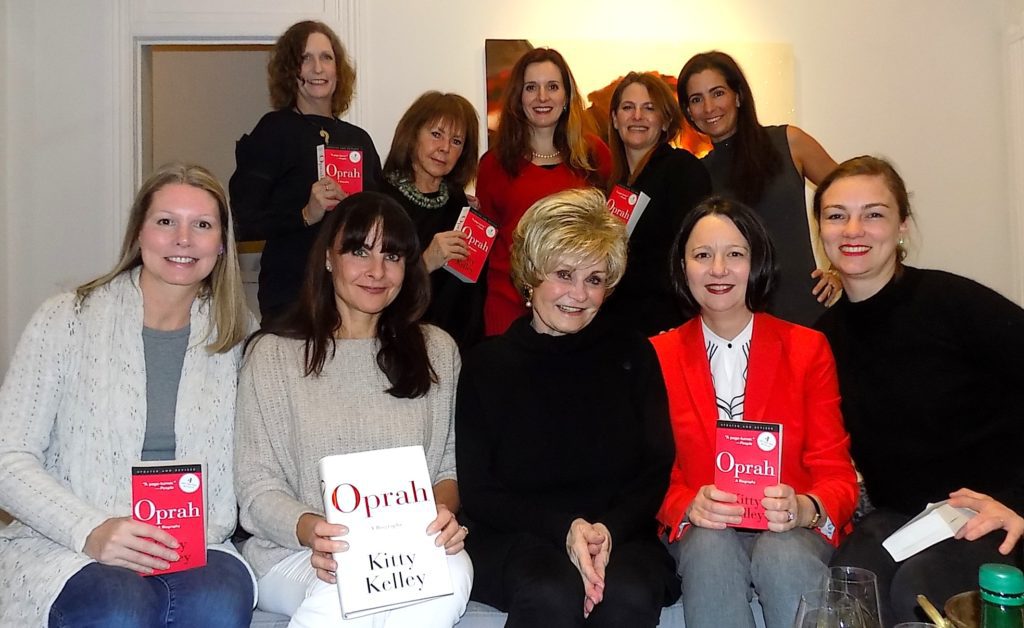‘All In’ for the Georgetown Book Club
By • January 23, 2019 0 1710

By Kitty Kelley
[Editor’s note: Usually in this space, The Georgetowner runs book reviews by author Kitty Kelley. In this issue, we switch it up and find Kelley joining a group of Georgetown women to discuss one of her own biographies, “Oprah.”]
I’ve got a girl crush on the Georgetown Book Club. To a woman, they are attractive, professionally accomplished and whip-smart. They love to laugh and they definitely know their way around a few bottles of wine. They share a wonderful bond that has seen them through divorces and remarriages and pregnancies and everything else that life has thrown their way.
The club members have been meeting monthly for the last eight years to discuss fiction or nonfiction books that are either locally based or locally authored. “There must be a D.C. connection,” said one.
Since I’m a local, I got lucky a few nights ago and was invited to discuss my biography “Oprah.” When I arrived, they all had the book in hand and, with wine glasses filled, wasted no time getting started.
“If Oprah paid $43.5 million for 10 percent of Weight Watchers, why is she still so heavy?”
“She’s got issues,” said one, sympathetically.
“She’s also got a new pizza company,” said another. “I saw her on television doing a commercial.”
“Maybe she’s like an alcoholic who buys a distillery… to… you know… keep the stuff close at hand.”
Uproarious laughter all around. Then the women addressed themselves to me and how I wrote the book. I showed them the 100-page chronology compiled of Oprah’s life that I took to all my interviews, conducted over three years with a total of more than 800 people.
“How did you find out that Oprah had had a baby that died at birth when she was in high school? I didn’t know that, and I thought I knew everything about Oprah.”
“How did you find the baby’s birth certificate?”
“Why did her father give you so many interviews?”
“Did she really eat two pecan pies by herself?”
“My favorite story was her telling Steven Spielberg after he gave her the role of Sophia in ‘The Color Purple’ that he should put her name on the movie poster because she was going to be reallllly famous.”
This drew different reactions. “Ugh,” said one, “so arrogant.” Another said, “Well, she was right, wasn’t she? She did become reallllly famous.”
Discussion then ricocheted to Oprah’s undeniable charisma and her immense self-confidence—also the fact that she disowned the poor family into which she was born to make a better family for herself, with Maya Angelou as her mother-mentor, Gayle King as her sister and Stedman Graham as her everlasting live-in partner, whom she refuses to marry.
“Can you imagine what that pre-nupt would be like?”
More laughter followed by more wine. Then, prompted by their questions, I careened into war stories about writing other biographies. I recall telling them about my interview with Frank Sinatra Jr. for “His Way: The Unauthorized Biography of Frank Sinatra,” and how the son of a man connected to organized crime was going to tell me what happened to Jimmy Hoffa when the photographer accompanying me dropped his cameras to the floor in disbelief, disrupting the interview and sending Sinatra Jr. running out of the room.
At one point, I think I remember answering a question by quoting JFK, who said: “What makes journalism so fascinating and biography so interesting is the struggle to answer that single question: ‘What’s he like?’ ”
By the end of the evening, the wine bottles were almost empty, but the room remained divided on Oprah. All agreed that she personified the bootstrap success of the American dream, but, as one said: “Oprah is like the Grateful Dead—you’re either all in or you’re not.”
For me, there’s no “either-or” on the Georgetown Book Club. I’m all in.
Georgetown resident Kitty Kelley has written several number-one New York Times best-sellers, including “The Family: The Real Story Behind the Bush Dynasty.” Her most recent books include “Capturing Camelot: Stanley Tretick’s Iconic Images of the Kennedys” and “Let Freedom Ring: Stanley Tretick’s Iconic Images of the March on Washington.”

